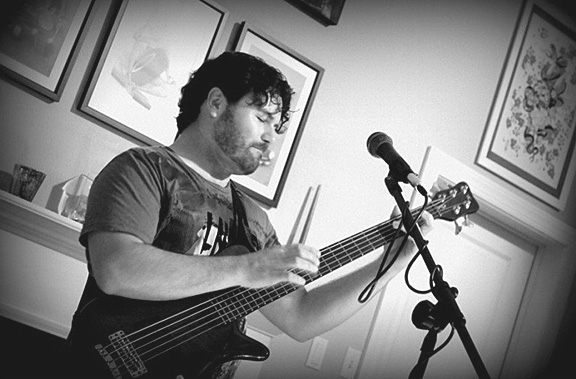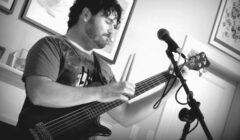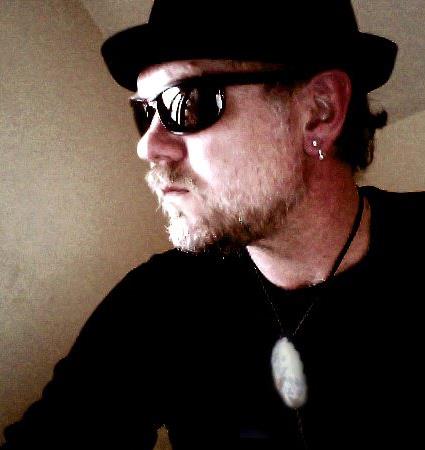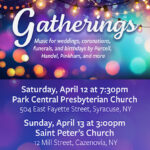Seth Horan: The Uncommon Ways of a Bass Master
There are novices…
There are recreationalists…
There are students and teachers…
There are experts…. enthusiasts…
Fundamentalists
And then there musicians-from-outer space-good. Originally from Buffalo – now living in Syracuse for about a decade – I actually met Seth Horan in San Marcos, CA at a house concert that I was playing with my group. The violin player in our group had recommended her touring musician friend for opening the show since he was passing through town.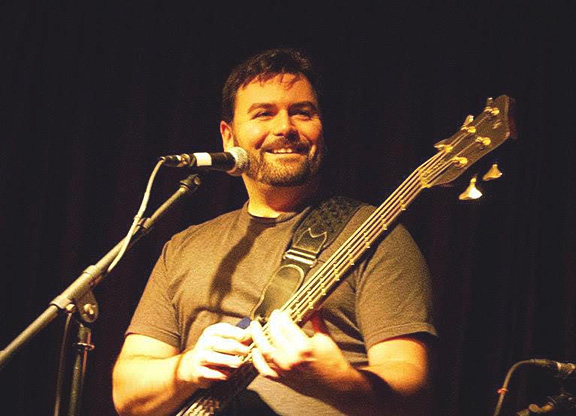
I remember thinking that this would be interesting. He’s going to appear as a singer-songwriter accompanying himself with bass. Don’t see much of that these days. They said he was great, so I was looking forward to seeing what Seth was all about. He was outer-space-super great. Seth’s approach to bass is not exactly the standard melodic approach. Seth plays the whole band on his bass…. rhythm, melody, countermelody, implied percussions….. oh, and bass lines. It’s a lot of fun to witness as Horan makes for an impressive triple-threat with the inclusion of his writing and composition proficiency and the fact that he’s a helluva singer. While we’re at it, throw in the fact that he’s comfortable at the elevated level of musical prowess that invites taking chances…. we can classify him as “dangerous.” He’s had a robust career, spending time with labels such as MCA and RCA in his earlier days with a number of groups. It didn’t take him long to move away from the group idea in pursuit of his unique vision. By going solo, accompanying himself on bass as a songwriter-vocalist, he took confidence in the comfort of staying true to his clear inspiration.
With a solid stature in the college market, Seth toured heavily throughout the east coast in the late 90s only to find himself in Los Angeles by 2001 where he also became an active member in the Los Angeles chapter of the Just Plain Folks Music Organization. He’s received numerous Fellowship awards for his work in Los Angeles and in Nevada.
On the strength of his performances, Horan was contracted to be Warwick’s first-ever bass clinician and product demonstrator. After two weeks of intensive training in June 2006 at the Warwick factory in Markneukirchen, Germany learning the details of what makes Warwick’s instruments special, he began performing and leading bass clinics both within the US and internationally – traveling to Canada, the United Kingdom, Germany, Spain, Portugal, Italy, Hungary, Denmark, Sweden, Norway, Brazil, mainland China, and Australia. Most recently, Horan represented Warwick at the January 2008 NAMM show and March 2008 Musikmesse – all this while maintaining a significant tour schedule in the US.
Horan by now has also amassed a healthy league of students has seen the future of skype technology potential. He started taking lessons online with the advent of video-conferencing technology. His story is big. Let’s talk to him.
Chuck Schiele: Hi Seth! We meet again, Brother. Thanks for taking some time to chat with us here at Sound of Syracuse.
Seth Horan: Great to see you, Chuck! Thank you. I’m happy to be part of this.
CS: Please tell us how you came to be a bass player in the first place.
SH: By 6th grade, I had spent time taking piano lessons and trombone lessons. I wasn’t very good at either instrument, and it was because I never wanted to practice. I loved music; I loved performing in school – I just couldn’t bring myself to put in the work on my own. My dad had an idea: Why don’t you play an instrument that’s too big to carry around? That way they can’t make you take one home, and you won’t have to practice?
=
I was sold. I narrowed potential instruments down to the double bass and the xylophone… and then one day I saw a girl walking home from school carrying an odd-shaped suitcase. I asked her what was in it and she showed me: A glockenspiel; a tiny xylophone. Horror. So, the double bass was my last hope of staying lazy. I went to my middle school orchestra director and told him I wanted to play the bass. Turns out, the double bass was his primary instrument, and he was so excited by this random student asking to play it that he put one in his pickup truck and drove to my house with it that same day. The whole plan completely backfired, but it was the greatest mistake I ever made because it was the “right” instrument.
Instead of blowing off practicing to do other things, practicing became the thing I would do to blow other things off. Total life-changer. Then, by eighth grade, I had the opportunity to form a band. This seemed like a good way to get the attention of girls, so adding the bass guitar became a fast necessity. The girl-thing didn’t work out at the time, but the bass-thing sure did.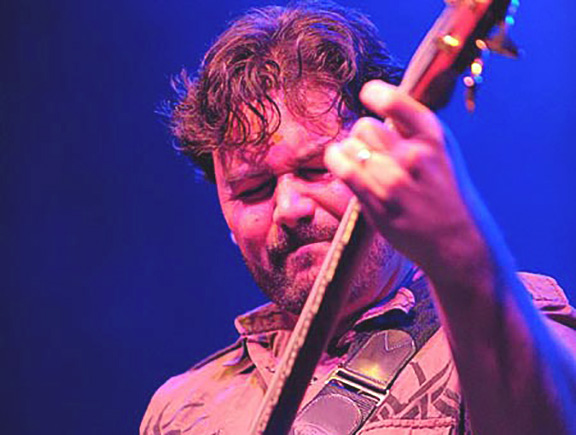
CS: How did you get to this uniquely expressive place as a bass player/songwriter?
SH: I’ve spent many years performing as a solo act – just accompanying my voice with my bass guitar, and adding a loop pedal for certain songs. That wasn’t the original plan, though, for sure. I’ve always tried to express myself on the bass in uncommon ways, but until my mid-twenties, that was only in the context of a band. Creative conflicts happened in every group I was involved with because some of my former bandmates either couldn’t or wouldn’t play the music I was writing. In order to get my own music out, I had to start performing alone, and at the outset, I really did consider trying to play the songs on the guitar…but it just took away so much of what made the songs special to me, so I stayed where I was comfortable. I’ve dealt with a lot of bias and a lot of funny looks over the years, but it’s been worth it.
CS: Please tell us a bit about your career and some of the highlights along the way.
SH: I was a ‘band bass player’ all through the 90s. Two of the groups I played with went on to get major label record deals (One had a great name, but never had a hit, so no one’s heard of them. The other had a huge hit but had a horrible name, so no one remembers them). Once I went solo, I started getting bits of recognition on the internet; some awards from songwriting groups and indie music sites. I had a record deal with
a short-lived independent label, which opened a few doors for me at the turn of the century, but they signed too many artists at once and went belly-up just a few months after they released my album. Then in 2006, I played at the NAMM Show in Southern California, and the head of Warwick Basses was in the audience. I worked with them for the next two years, performing at Warwick clinics around the world. The financial crash in ’08 put an end to that, and I began focusing more and more on my teaching practice.
CS: You’ve been teaching a long time, now, too…
SH: I have. I’ve been giving informal lessons for as long as I’ve been playing, but I took my first actual teaching job at a couple of music stores around Buffalo, NY in 1999-2000, right before I got on the road with my solo career. I also gave lessons during my touring years; people could schedule time with me on my off-days and I’d come to their homes and talk bass for a few hours. (One of those students was Jessie Wilson, who went on to start ish Guitars). When I worked with Warwick, I also had a private practice out west, right up until I came to Syracuse in 2011.
The first thing I did when I came here was teaching at the Redhouse Rock camp, and the next was to offer lessons over the internet using Skype. I knew it wouldn’t be a big idea just then, but I figured it would gain popularity over time, and it did. Over the past decade, I’ve been teaching students all over America, and I’ve had students in Canada, England, Germany, Finland, Spain, Australia, and even Abu Dhabi as well. A year ago I migrated over to Zoom, and of course, there’s been a paradigm shift with online learning – now even my local students are online until the public health concerns are under control.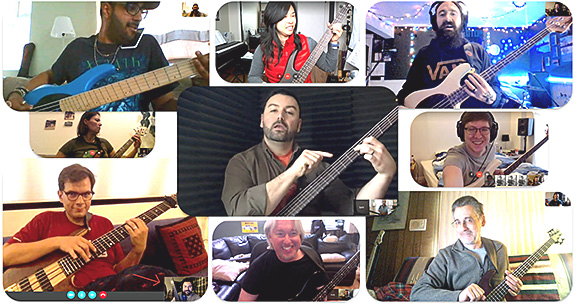
CS: Amazing. As a teacher, where is your focus?
SH: The simple answer is, “I focus on the student.” That might seem obvious, but I’ve been kind of shocked to find that many teachers teach individual students no differently than they would teach a classroom – they focus on the material, with the idea that “I’ll cover Unit A today, Unit B next week, Unit C the next, and then give a test in week four” – with no regard for how well the student is getting along. I think that’s insane. I’m not on a deadline, and I don’t give ‘grades’ or offer ‘certificates of completion. If I introduce an idea in Week One, and the student is having trouble with it in Week Two, then we’re going to stay put and tackle the concept from a few different directions until there’s no more confusion – until the student can actually *use* the concept when they play. And if we don’t move on to the next thing until Week Three or Week Four? So be it.
CS: Similar thing when it comes to the shallow vs deep end in swimming pools.
SH: Everyone learns at a different pace, so no two of my students are ever working on the same thing at the same time. Also, we’re working on improving at music, which is an art form people tend to feel very possessive of and defensive about. No two students have the same musical goals or even like the same genres. Some of the songs I work on with one student in order to get an idea across will be completely different than the songs I work on with another. I had one student who told me on Day One: “I am only interested in learning the bass parts to songs by the band Morphine.” Well, the bassist from Morphine played bass with only two strings on it, he didn’t have them in standard tuning, and he played with a slide. But it’s what the student wanted, so that’s what we did.
CS: Which bass players get your attention, these days?
SH: I feel like I should be answering this with the name of the latest flashy, advanced technique player I watched on Instagram…but…
CS: No. I want to know what you think.
SH: I actually haven’t heard a ton of exciting stuff on social media lately; it’s all geared to grab your attention, but that doesn’t mean it’s great. Lately, I’ve been doing a deep dive through songs that I feel like I didn’t spend enough time with growing up, so most of the players on the tip of my tongue had their heyday decades ago. Bruce Thomas (from Elvis Costello’s old band, the Attractions); Bernard Edwards (from Chic and a dozen other acts), Colin Moulding (from XTC); Norwood Fisher (from Fishbone); Lee Sklar (mega-session player; too many credits to list). They’re certainly not the flavor of the month, but I think they’ll stand the test of time more than some of the Insta-bassists.
Actually, wait. There is a legacy player I’ve been listening to who’s currently active: Fat Mike from NOFX. Man, that guy can keep time at insane tempos… while singing, no less.
CS: Fat Mike. Quite possibly makes the top 5 best bass player names ever category, eh? Cool. Okay, Seth, I certainly appreciate you stopping by to chat with us here at Sounds of Syracuse. How do we stay in touch with you and your music?
SH: Anyone who’s interested in trying a trial lesson with me can contact me through zoombasslessons.net.
Otherwise, I’m slowly emerging from my artistic hiatus, and when I release new music I’ll post it on my Bandcamp page (sethhoran.bandcamp.com). Cheers!